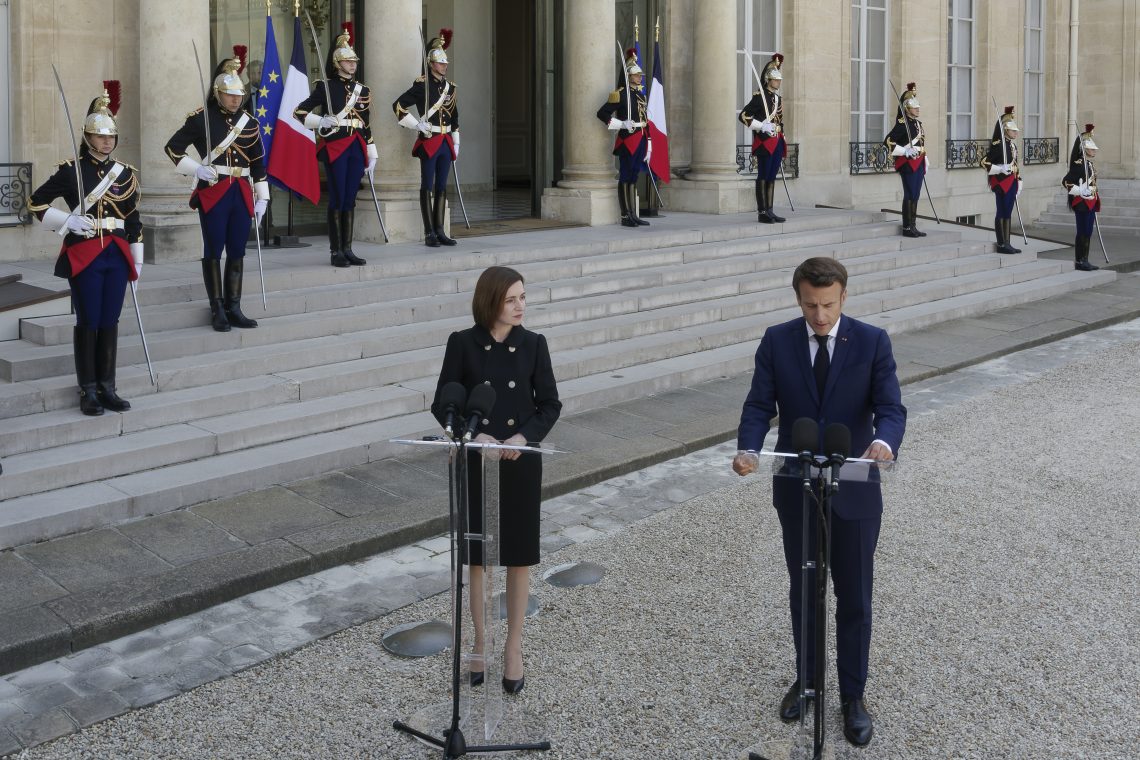After the French elections, what kind of Europe?
Reelected President Emmanuel Macron favors reducing the European Union’s dependence on nations outside the bloc while promoting French national interests from within.

In a nutshell
- Discontent with the European Union is high in France
- Emmanuel Macron’s party is the only successful pro-EU party left in France
- Macron will pursue protectionist trade policies within the EU
On December 31, 2021, a giant European Union flag was hoisted under the Arc de Triomphe in Paris to celebrate France assuming the rotating EU Council presidency for the first half of 2022. Within 48 hours, the flag was withdrawn following an outcry from French nationalists claiming the government had betrayed the Grande Nation. Could it be that France is not the champion of something like the United States of Europe after all?
Obviously, many more EU flags would have been removed if Marine Le Pen had won the final round of the presidential elections this April. Accordingly, there was a big sigh of relief in Brussels and most national capitals when President Macron won the April 24 runoff election with 58.6 percent of the vote. It is debatable, however, whether this was a resounding vote for Europe, as most commentators claim, or just a concerted vote against Ms. Le Pen.
First, many voters in the second round abstained or gave blank votes. Only 38.25 percent of registered voters voted for President Macron.
Second, one should bear in mind that in the April 10 first round, a majority of French voters chose a candidate of the radical right (Eric Zemmour, Ms. Le Pen) or radical left (Jean-Luc Melenchon). Each of these candidates advocated dismantling the EU from within by deliberately breaking or ignoring basic rules of the EU treaty that conflicted with the French national interest.
With the formerly mainstream parties of the center-right and center-left crushed (all below 5 percent), President Macron’s La Republique en Marche (LREM) remains the only successful pro-EU party left in France. And indeed, the French president has bravely defended the EU against a tide of euroskepticism. Polls show that disenchantment with EU membership is highest in Greece and France.
Facts & figures
What kind of Europe?
But just how pro-European is he really? Or rather: What kind of Europe does he have in mind? This question is important since – whether forced into cohabitation with a more left-wing government or not – the French president will assume a role of leadership in the EU in the coming years. One reason is that after 16 years of German Chancellor Angela Merkel, her successor, Olaf Scholz, is unlikely to develop great ambitions or a captivating vision on the European stage. Mr. Scholz is now seen as a procrastinator, and not only when it comes to showing resolve toward Russia.
For Mr. Macron it has long been a strategy to pursue national interests via European policies and legislation.
Right after his election, the French president proclaimed: “I want to thank all the French who … gave me their confidence to realize our project for a more independent France, for a stronger Europe.” The idea of combining a more independent nation-state with a stronger union of member states may sound inconsistent. For Mr. Macron and most of his predecessors, it has long been a strategy to pursue national interests via European policies and legislation. The key slogans describing President Macron’s EU agenda are “European sovereignty,” “strategic autonomy” and “a Europe that protects.”
It is reasonable to suspect behind these buzzwords is a long-established French strategy: to create a Europe a la francaise and implement French dirigisme, mercantilism and protectionism at the European level.
The French have never championed free trade.
A closer look at the French agenda for the Council presidency supports this view. The French have never championed free trade. Mr. Macron wants EU trade policy to even more strictly use mirror clauses, which means that European or, even better, French social, environmental or consumer protection standards should be upheld for goods (especially agricultural products) or services imported into EU markets. The basic rationale is simple: raising rivals’ costs to the already high and often uncompetitive levels created by French overregulation.
Resistance from free traders
More free trade-oriented member states, as well as the World Trade Organization (WTO) and EU Trade Commissioner Valdis Dombrovskis, fear that the French interpretation of a “level playing field” on a discriminatory sector-by-sector basis will obstruct future trade agreements and lead to endless disputes among trading nations.
The idea of charging a tax on high-carbon imports at Europe’s borders (roughly equivalent to what European producers of steel, iron, or power must pay under the EU cap-and-trade carbon market) is met with less resistance by Brussels and member states. However, the attempt to force the rest of the world to follow the EU’s climate ambitions may lead to further trade disruptions, retaliation and disputes.
Traditionally, France is at the forefront when it comes to harmonizing taxes, i.e., urging other countries to raise their corporate taxes to reduce the comparative tax burden for their own producers. Together with the Organisation for Economic Co-operation and Development (OECD) and G20, the first steps toward taxing digital firms and introducing a minimal global tax rate have already been agreed upon.
State aid and industrial policy
On the fiscal expenditure side, France has never been happy with EU law that limits state aid to protect effective rules-based competition in the European single market. Here again, Mr. Macron aims to combine strategic autonomy for both France and Europe. Not unlike former U.S. President Donald Trump, he champions a buy national strategy, like when he proudly pledged “100 percent French supply chains” for electric cars, offshore wind farms or solar panels. In addition, he expects the EU to greenlight his ideas to let the French state take over capital control of more industries such as energy giant EDF.
In addition, Mr. Macron wants the EU itself to become a major actor in state aid and industrial policy (“picking the winners, protecting the losers”) and mobilize huge sums of subsidies to key industries such as microchips, cloud technology, hydrogen and batteries. This puts him at odds with Margrethe Vestager, the Danish competition commissioner. And it begs the question: Who decides and who pays?
Unsurprisingly, France is keen to turn the exceptional emergency tool – the 800 billion-euro pandemic recovery fund – into a regular instrument for the EU to issue mutualized debt to fund strategic policy goals such as boosting defense, fighting climate change, or achieving autonomy in areas like energy, food or digital. This would mean that not only the Stability and Growth Pact that once tried to keep the national debt of eurozone members in check is likely to be “reformed” beyond recognition. The resistance to the mutualization of debt on the EU level is equally likely to fade, not least thanks to French doggedness.

Reducing dependencies
Mr. Macron’s vision for Europe is expected to continue to bear fruit. In fact, Russian President Vladimir Putin’s war on Ukraine and the pandemic have greatly enhanced the overall appeal of a “Europe that protects” and develops strategic autonomy on many levels. Both terrible events have shown that a unilateral dependency on undiversified supply chains (be it Russian gas, Ukrainian wheat, microchips made in Taiwan or face masks made in China) can lead to severe bottlenecks when trade is disrupted. It therefore makes sense to pursue energy, food and digital independence.
The French interpretation of “sovereignty” or “strategic autonomy” is particular and often smells of protectionist autarchy. A truly liberal reaction would embrace a very different strategy: to increase and intensify trade deals with other countries to diversify the options for European imports and exports away from a one-sided dependency on China or Russia in specific sectors.
Scenarios
Which strategy will the EU choose? Now it seems there is momentum for Mr. Macron’s mercantilist visions of a sovereign Europe. But the question remains whether the momentum will also create a turning point that might expedite European integration into something like the U.S.
One could doubt whether an EU with substantially reduced power and competencies of member states is what the French president and his predecessors had in mind. Nonetheless, regarding policies on migration, energy, trade and state aid to industry, Mr. Macron seems to push for less Europe. He does so even when it comes to the EU’s core function: to safeguard and extend the single market. Considering the recent election campaign and the general mood in France, this inherently euroskeptic attitude is likely to prevail.
However, President Macron’s desire for changes that lead to “more Europe” (allowing the EU to raise its own taxes, issue its own mutualized debt, subsidize its own industry, establish its own army) face formidable constitutional obstacles. To become permanent, treaties would have to be changed. And this needs to be agreed upon and ratified by all 27 member states. Explicit and comprehensive treaty change is a Pandora’s box that most EU member state governments would prefer not to open. Hence, a constitutional moment for radical change is not on the horizon. But in the present crisis mode, the trend that prevails may be welcome by President Macron: a more protectionist, interventionist or etatiste Europe.








